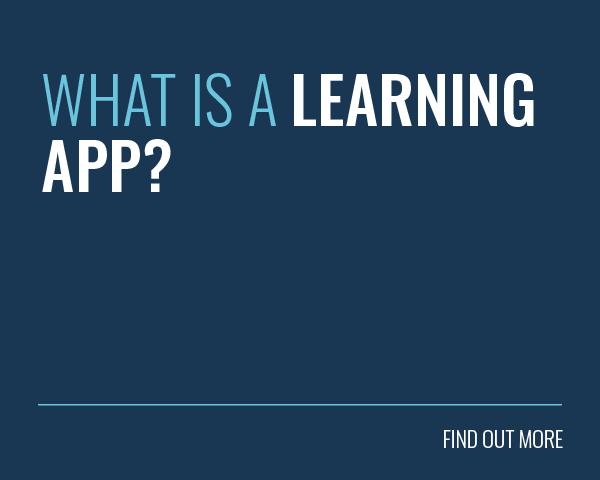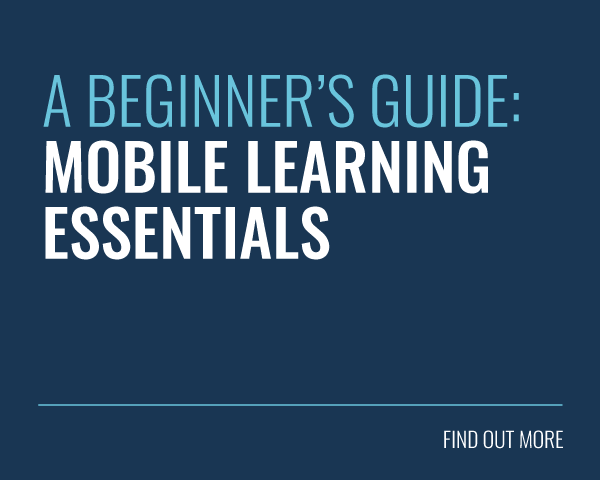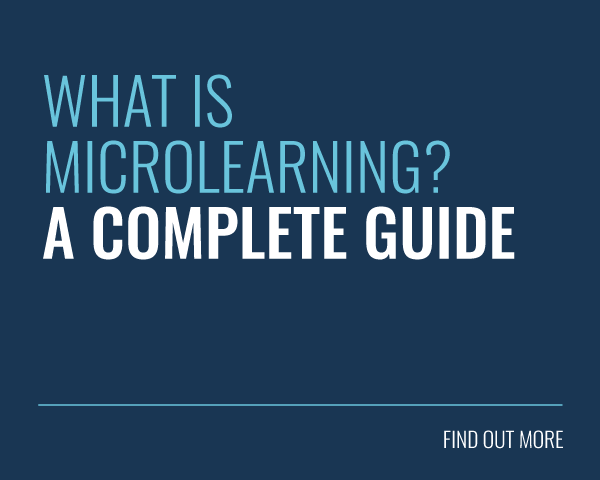The mobile learning revolution is well underway. Our super-connected workforces now have a gateway to the majority of human knowledge sitting in their pockets. But now we have all this power at our fingertips, what exactly do we do with it? How do we create the perfect mobile learning strategy?
We spoke to Brandon Carson, Director of Learning at Delta Air Lines, renowned author and popular speaker, to get his thoughts on this topic. Below is a list of questions. Click on any of these links to jump to Brandon’s answers.
- What’s the difference between ‘mobile first’ and web-based learning systems?
- What are the advantages of a mobile learning strategy?
- How do you know a mobile learning strategy is working?
- How should you set about devising a mobile learning strategy?
- What considerations should you make during the implementation phase?
- Can a mobile learning strategy be leveraged during times of crisis?
 Growth Engineering: What’s the difference between a mobile first learning strategy and the current norm of a web-based learning management system?
Growth Engineering: What’s the difference between a mobile first learning strategy and the current norm of a web-based learning management system?
 Brandon: I think it depends on your overall content strategy. Quite frankly, in my work environment, I’ve always needed to deliver learning experiences across multiple modalities. The philosophy behind ‘mobile first’ is far from new.
Brandon: I think it depends on your overall content strategy. Quite frankly, in my work environment, I’ve always needed to deliver learning experiences across multiple modalities. The philosophy behind ‘mobile first’ is far from new.
If you think back to the 70s, when Standard Generalized Markup Language (SGML) was created, it was all about providing descriptions of a document structure, with the intention of separating content from its display. In doing this, content has become more portable.
In our work, we often need to support various devices, all with different display mechanisms. As such, it’s important to create a content strategy that’s agnostic to a specific delivery channel and can be easily optimised across multiple mediums.
But this isn’t easy. Only about 8% of the average learning professional’s design and development time is spent curating content.
As a result, we are forced to be content creators ourselves. That’s what we do. And too often, we marry the content to the display it sits within. In today’s environments, many of us are still focused on first delivering through traditional web browsers and then ‘converting’ it to mobile after the fact.
This is clearly not an optimal approach. We have a generation of workflows and processes to update. It’s important to evolve away from what traditional systems dictate, and make the move toward device agnostic processes.
One of the biggest challenges we face is an overreliance on specific tools. This is often because our team has become fluent in using a particular tool, or following a particular process. This fluency then forces a reliance on a particular content strategy and can sometimes result in an unwillingness to try new approaches.
For instance, we may stick to a traditional web-based learning management system, regardless of whether a mobile-first learning solution is better suited to our end users.
 Growth Engineering: What are the primary advantages and benefits of a mobile learning strategy?
Growth Engineering: What are the primary advantages and benefits of a mobile learning strategy?
 Brandon: From my perspective, mobile learning can have the most significant impact on workforce productivity. I mean, everyone, everywhere is mobile. Pretty much everyone has a mobile device.
Brandon: From my perspective, mobile learning can have the most significant impact on workforce productivity. I mean, everyone, everywhere is mobile. Pretty much everyone has a mobile device.
As the digital era unfolds, more and more of us have started to utilise multiple devices during the day, to help us get work done and stay connected.
As a result, learning is becoming less and less a separate activity from everything else that we do. That’s why we have a focus in my organisation on mobile. I think every L&D operation should have a focus on it. At the very least, they should have it as part of their overall strategy, as that’s how people are getting their work done nowadays.
 Growth Engineering: What are the indicators that you look for to validate that a mobile strategy is working within an organisation?
Growth Engineering: What are the indicators that you look for to validate that a mobile strategy is working within an organisation?
 Brandon: I would look at it from two lenses. First, is to really understand that mobile is simply a way to deliver content. As such, it should form a part of your overall content strategy and your overall learning approach.
Brandon: I would look at it from two lenses. First, is to really understand that mobile is simply a way to deliver content. As such, it should form a part of your overall content strategy and your overall learning approach.
It’s best suited for performance support in the moment of need, but it can also be leveraged to provide much deeper learning experiences.
Secondly, I think we need to understand how our target audiences actually use mobile devices whilst working. There are specific behaviours that people engage in during the day when they’re using their devices.
We need to understand these behaviours and use them to our advantage. One of the most critical things that we use our mobile devices for is to find information. To do this, we run a search.
We should use this understanding to drive the decisions we make within L&D departments. Our goal should be to become the source for finding this information, as and when it relates to your organisation or any tangential subjects. If your learners try your learning portal before they try Google or Youtube, that’s a promising sign of success.
 Growth Engineering: How do you set about devising a mobile learning strategy that is perfect for your organisation?
Growth Engineering: How do you set about devising a mobile learning strategy that is perfect for your organisation?
 Brandon: I think we have to step back and really look at a few fundamentals here. It’s easy to make assumptions about how and why people access their mobile devices.
Brandon: I think we have to step back and really look at a few fundamentals here. It’s easy to make assumptions about how and why people access their mobile devices.
But instead of assuming, we need to do the work to uncover how we utilise our devices within a workplace environment. It’s only by doing this that we can see the right way to integrate mobile learning solutions into the flow of work.
John Hagel, who is co-chairman for Deloitte LLP’s Center for the Edge, cautions us by suggesting that too many L&D departments make too many assumptions about how work gets done. In fact, he says that if you go out and spend a significant amount of time with the workforces that you support, you’ll likely find that what you train, or offer as training products, probably doesn’t hit half of what their needs are.
As such, you need to understand what the barriers, constraints and environmental factors are that impact the way we work. We as the training folks need to understand this, not so we can cover all of this with training content, but so we can understand how people approach their job, and how they get things done.
 Growth Engineering: What advice would you give for L&D departments seeking a successful mobile learning launch?
Growth Engineering: What advice would you give for L&D departments seeking a successful mobile learning launch?
 Brandon: If you sit within L&D for your organisation, you are the team responsible for crafting a mobile experience that makes sense within the workflow that your wider team operates in.
Brandon: If you sit within L&D for your organisation, you are the team responsible for crafting a mobile experience that makes sense within the workflow that your wider team operates in.
With this in mind, you’ll invariably need to interact or engage with other business partners or other functions in the organisation to help break those barriers down, or remove any systemic constraints. This is something we’re often not used to doing.
When launching a mobile learning solution, you may need to work with IT, marketing or even your comms team. Here at Delta Air Lines, we had to work with all these other functions within the organisation to get a seat at the table and earn space on our team’s devices.
In that sense, the key to success is good knowledge of the way things work within your organisation. Similarly, a good working relationships with those who can help you navigate this environment is essential.
There are also a lot of small considerations you need to make. For instance, how do you design an app icon that is easily noticed by your employees, to ensure they don’t forget it’s there. This kind of skill often lies outside of our capacity as learning designers. In this sense, one of the challenges is embracing new skill-sets, or further building out those partnerships, as mentioned earlier.
You also have to bear in mind that you are building something that will need to be updated often. So you have to think about this workflow and any changes it necessitates from your organisation’s perspective. It’s an ongoing ecosystem that’s alive and needs to be moderated and maintained.
 Growth Engineering: How can a mobile learning strategy be leveraged in a time of crisis?
Growth Engineering: How can a mobile learning strategy be leveraged in a time of crisis?
 Brandon: We’re obviously going through a lot of change globally at the moment. This is a once in a lifetime pandemic. Many businesses and organisations have been impacted in drastic ways. But here’s the thing: the same hyper-connected network of people who created the pandemic, will solve the pandemic.
Brandon: We’re obviously going through a lot of change globally at the moment. This is a once in a lifetime pandemic. Many businesses and organisations have been impacted in drastic ways. But here’s the thing: the same hyper-connected network of people who created the pandemic, will solve the pandemic.
What’s become more apparent than ever before is the crucial nature of L&D within an organisation. Within my company, we’re now being called into almost every business continuity question or meeting. We have a unique role in ensuring the humanity of work is preserved through a crisis and that it’s recognised and rewarded. Building deeper relationships, empathy and healthier habits to help workforces to be their best is truly a key aspect of being successful at work.
When we think about how we do this, we should start thinking about our devices. We all have a mobile device on us at all times. These devices can deliver the communication and collaboration you need within your workforce.
Mobile is a perfect communication channel for that. Smartphones are the most advanced real-time collective content and learning mechanisms ever created. You should be using them in times of crisis to help support your team in the right way.
Final Words
Mobile learning apps revolutionise workplace learning, but only if they’re implemented and utilised properly. To drive towards success, we need to combine learning best practice, behavioural science and knowledge about how we use our mobile devices into one super effective approach.
That’s what we did to create Growth Engineering Learning App, a customisable mobile learning app that makes changing behaviour and improving performance easy.
Click here to sign up for a demo of Growth Engineering Learning App now!









